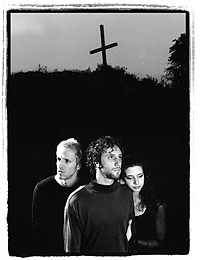Boston Globe: Living | Arts
Davies in the wings for ‘Preservation’
By Jim Sullivan, Globe Staff, 10/02/98 | The Boston Globe Online | Boston.com
Ray Davies, singer-songwriter for the Kinks, wrote the pair of conceptual albums ”Preservation Act 1” and ”Preservation Act 2” a quarter-century ago. The Middle Ages of rock ‘n’ roll, if you will. So, go ahead: Blow the dust off the old RCA records, or better still, pick up the re-releases on Velvel with bonus tracks. Some good tunes, but maybe it’s all a trifle dated …
A ”reform” politician, who is himself clandestinely corrupt, is challenging a glib leader who has long been morally bankrupt for the control of ”the Village,” once a happy little spot now gone to rot. The common people’s lot? To be doormats and pawns. The politicians’ ultimate aim? To line their own pockets and zombify the public. There are moments of hope and some brilliant melodies at work, but it’s a persuasively cynical and cyclical work, one that does not portend well for the people.
Which would make ”Preservation” about as topical as today’s paper.
Davies, on the phone from New York, references not the political travails in the United States, but what has happened in his native England. ”I was the most depressed person,” he says, about Labor Prime Minister Tony Blair’s coming to power, taking over from the conservative John Major. ”There will always be a new Tony Blair or somebody, a Mr. Right coming in and turning out the same as everybody else.”
”Preservation” has long been a favorite of Boston Rock Opera co-founders Mick Maldonado and Eleanor Ramsay. The group staged a one-night-only performance of ”Act 2,” which is where most of the ”action” happens, in 1993 at the Middle East in Cambridge. The company will be kicking up an expanded, revamped ”Preservation” (both acts) for six nights, Fridays and Saturdays, at the Tower Auditorium, Mass. College of Art, eleanor1 Huntington Ave., beginning tonight at 8:30. Maldonado has the lead as the venal Mr. Flash; Brian Gottesman is the so-called reformer Mr. Black; Letters to Cleo singer Kay Hanley plays a floozy named Belle. It’s directed by Jane Bulger and Ramsay.
”I went up to see Eleanor a few times when I was in Boston,” says Davies, who generally splits his at-home time between New York and London, ”and gave her my blessing because it’s good she’s got the energy to keep going with it. I stopped by to see a staging last weekend, and I was quite impressed with what they were doing. But it’s their production. Not to be confused with me doing a Pete Townshend.”
Ramsay says some cast members’ hearts skipped beats when they found out Davies was going to catch a rough run-through. ”He had some very constructive comments,” Ramsay says. ”Ray was filled with ideas – there were some changes, and he encouraged us to go with some ideas we had but were unsure of.”
”I think I tuck myself away,” says Davies, of his on-set presence. ”I’ve been in these situations before and it is difficult to have the person who wrote the piece there. But after a while they’re so concerned with what they’re doing it’s difficult to think about what the author thinks. They’re stuck in the middle of it and they’re on their own journey.”
Davies pooh-poohs his contributions – ”I can’t compliment the musical performance highly enough” – noting, with a chuckle, that he was primarily concerned that Maldonado wasn’t making the dastardly Mr. Flash evil enough. He was pleased that the show had been sufficiently ”de-Kinked,” and he also tweaked the ending a bit.
The Kinks toured the United States only once behind ”Preservation,” in 1974, and did a just a weekend of shows at a London theater.
A second story, one that rides alongside the political theme, says Davies, is the tale of ”Preservation”’s Tramp, the everyman/observer who is ”an alcoholic, a beggar, really. It’s also one man’s struggle to get his life together. I love the element of somebody trying to do some personal or trival things against this big backdrop. The parallel is that the things that bring Flash down are there in [the Tramp’s] personal life.”
Davies, dubbed by some as the godfather of Britpop for his influence upon Blur, Pulp, and Oasis, is the master of writing about flawed characters, with many of the songs being self-critical.
Davies says the problem with staging ”Preservation” is that 1) it wasn’t written for the stage, and 2) was in fact written under pressure. The Kinks’ recording contract, the band’s commitment to deliver new music, forced Davies to move ”Preservation” along the pipeline faster than he would have liked. Some of the linking segments, he suggest, need work. At the time, he says, ”I didn’t have much time to sit around, do workshops, and get fancy directors in. You just have to put the thing up and go out.”
What Davies has gleaned from the rock opera group’s rehearsal is this: ”I was amazed how the music carries the story.”
This story ran on page D12 of the Boston Globe on 10/02/98. © Copyright 1998 Globe Newspaper Company.

